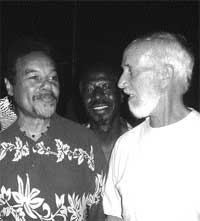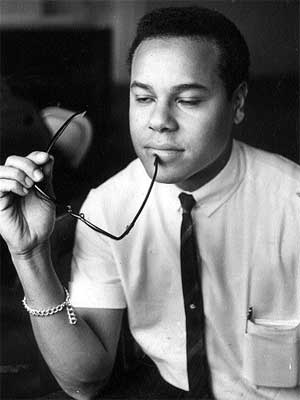Andre Tanker's World
Andre Tanker with Ivan Laughlin (right) and veteran pannist Clyde "Lightning" George (centre) at last Wednesday's jazz-jam at Phase II Pan Groove panyard, Woodbrook. Courtesy Cathy George
By Terry Joseph
Andre Michael Tanker: September 25, 1941-February 28, 2003
By his own admission, Andre Tanker considered Drum Trinity (1988) his finest concert and planned to repeat the work later this year "for those who came in late", his unique way of saying that in the 15-year interim, a whole new audience had warmed to the concept of national unity.
Produced by George Ng Wai and this reporter, Drum Trinity was staged over two weekends at the Central Bank Auditorium in August that year, in celebration of the 25th anniversary of Independence. With Tanker pivotal, the show revolved around the three rhythms that drive the spirit of Trinidad and Tobago-African, Indian and steel drums.
It was Andrew Beddoe's last public performance with his drum Betsy.
It was Tanker's oft-expressed dream to use his band One World Contraband as a medium for uniting the tribes through music, a task that yielded success, if measured from the Bim soundtrack (1973), in which he ran the gamut of indigenous music styles, from the lilting sitar-lead on "Carapichaima" to Beddoe's strident vocal solo on the theme.
In 2003 he remained popular with a wide cross-section of music lovers both at home and abroad.
Speaking to the Sunday Express, Ng Wai (now manager of popular band Imij & Co) echoed Tanker's frequent requests for a repeat of Drum Trinity, a topic that came up between them as recently as Thursday night at MO2BS, where they collaborated on stage at the Mad Hatters Ball.
"We had been working together for most of the season, which sometimes brought back memories of the ole-time days and, every so often, Tank would say: ‘George boy, when are you and Terry going to do Drum Trinity again,"said Ng Wai, who played the Hilton weekly during 1963 and 1964 with Tanker and The Flamingoes, the first local group hired to work there.
"Funnily enough, when we were leaving the Mad Hatters Ball, Andre wanted to stay at the fete. It was strange for him and I suspect it surprised his family too because he asked me to help convince his wife Christine and (daughter) Zo-Marie to remain with him as he wanted to have a good time.
Less than 24 hours later, he was dead," Ng Wai said.
Considered by many as Tanker's closest friend, Ng Wai knew him for more than 45 years.
It was music that brought them together in the late 1950s, Tanker accompanying his sister Ann (now Tim Pow) to rehearsals of the Silvertones Steelband (with which George Ng Wai played), teaching himself the guitar during breaks.
Tanker had been exposed to the arts from even earlier through his mother Marie, a dancer, playing calypso records at their Woodbrook home to rehearse her pieces. That input broadened through his friendship with the children of legendary bandleader John "Buddy" Williams, who lived a stone's throw away.
At the time, Woodbrook was a community liberally sprinkled with top-drawer artistes. As a young boy, Tanker and David "Happy" Williams would go to Beryl Mc Burnie's Little Carib Theatre and offer to clean chairs before each performance, just so they could stay and take in the acts that would follow.
After recognising his interest in the yet emerging steelband music, pioneer Ellie Mannette, who also lived in Woodbrook, gave eight-year-old Tanker a tenor pan. He however showed greater affinity for stringed instruments but would later combine those disciplines to arrange Pat Castagne's "Treasure Island" for the Invaders Steel Orchestra while still a student at St Mary's College.
At age 17 he formed The Coronets combo and later, with The Flamingoes, pioneered the integration of steelband and conventional musical instruments, with Ray Holman featured on the tenor pan. Already an accomplished guitarist, Tanker taught himself to play the harmonica and vibraphone.
Tanker started a series of Sunday morning shows at the Deluxe Cinema, a concept that became a 1960s entertainment staple.
In 1970, Tanker started composing and wrote the musical score for "Ti Jean and His Brothers", a play by Nobel Laureate Derek Walcott. He would later score music for Mustapha Matura's "Playboy of the West Indies" and wrote the soundtrack for Earl Lovelace's "The Dragon Can't Dance", which toured the Caribbean, England and Canada. For last year's 40th Independence anniversary celebrations staging of Dragon, Tanker wrote 33 new pieces of music.
YOUNG Andre Tanker.
A 1970 sojourn to New York added scope to his music and by the same opportunity reaffirmed his roots, resulting most demonstrably in the seminal works "Basement Party" and "Forward Home", stories of his North American travails set to song, the latter with the poignant chorus:
"I went away
I leave and I come back home
Ah come back to stay
Ah must see mih way"
It was one of his pet peeves, this issue of the apparent inability of a number of artistes to survive in the absence of sponsorship. "You will never see the name of a bank or oil company preceding One World Contraband or Andre Tanker," he would often say.
And he did see his way, carving out a career that made him an in-demand act for some four decades. During the 1980s he prevailed upon Ng Wai and yours truly to stage a number of events, using The Little Carib Theatre and Astor Cinema extensively, shows that included "Thanks for the Music" and "Jammin' at the Crossroads."
Nor was it all for self. Tanker actually spent much of his time helping other artistes to perfect and show their work, that lot including Richard "Nappy" Mayers who, in duo with David Rudder, premiered the phenomenal "Bring Back the Ole Time Days" at a Tanker concert.
In the 1990s he received several awards, including two Caciques for best composer (1990) and best musical director (1995), earning a Sunshine Award in 1992 for outstanding contribution to Caribbean music.
During that decade Tanker issued a slew of recordings, expanding his musical horizons to break into the regular calypso market and collaborated with a number of international acts. He had long cultured a professional relationship with music legend Paul Simon, who frequently visited him at his Bossiere home.
As he entered the 21st Century, Tanker was selected by cable network BET for a feature on his music. In 1993, he travelled to New York and wrote the score for an adaptation of Shakespeare's "Measure for Measure", performed in New York City's Central Park and, three years later, released "Children of the Big Bang", a collection of his best works plus several new tracks.
In fact, Tanker achieved even greater popularity in the final ten years of his life, peaking on the party circuit with "Ben Lion" in 2002 and repeating the feat in the current Carnival season with "Is Heat", "Food Fight" and "Rough Jamming" performing the latter to a huge and receptive audience at MO2BS-a mere 18 hours before his death on Friday night.
Andre, thanks for the music
Previous Page / Terry's Homepage



